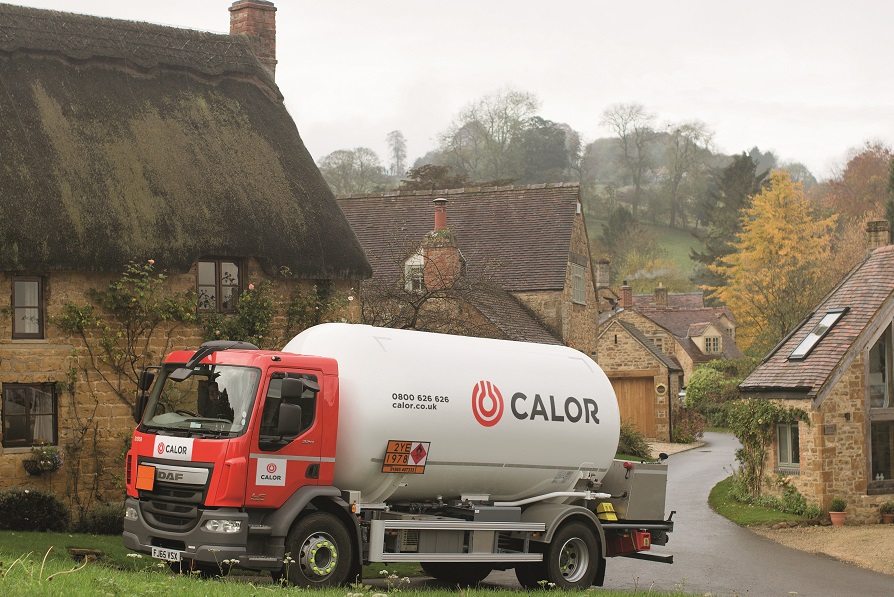Thinking of escaping to the country? The heating experts at Calor help explain the options when it comes to off-grid home energy.
Rural living allows you to escape the hustle and bustle of the city, and this new life in the slow lane can seem very attractive. However, choosing a home in the countryside is not all plain sailing, and there are a few things you must bear in mind before making the move.
One of these key considerations is how you are going to fuel your home. After all, choosing the right home energy for your new countryside property is a long-term decision, so you want to make sure you get it right.
Approximately four million homes in the UK are not connected to the mains gas grid, and rely on alternative fuel options. So how do you heat your home and get instant hot water if you have no access to mains gas?
There is a choice of fuels available to off-grid homes including LPG, oil, solid fuel, electricity, and renewables- not forgetting solar energy that you can fit to cut your running costs right back
LPG
LPG is the closest alternative you can get to being on mains gas. It’s versatile, and can be used for heating, hot water, gas cooking and appliances such as gas fires and tumble dryers. Becoming an increasingly popular choice for those living off-grid, LPG is the greenest and cleanest of all off-grid fuels as it produces less CO2 and harmful emissions than oil or solid fuel.
LPG boilers typically cost £900 less to purchase than an equivalent oil boiler, are more compact, and can be easily wall mounted, meaning they take up less space in your home.
There’s a range of storage options with LPG, including underground tanks and discrete cylinder packs, meaning there’s a solution for most outside spaces.
Unlike oil, it is virtually impossible to steal, and automatic top-up technology means your supplier will know when you will need a delivery and arrange this so you should never be left without gas.
It can also cost less than you think to install an LPG system. For example, an oil tank can cost as much as £2,000 plus the added expense of installation, maintenance and insurance to factor in. In comparison Calor will install an above ground tank completely free of charge and for a small charge are responsible for its maintenance.
If you want the closest option to being on mains gas in your new rural home, and benefits from instant heating and hot water, plus a reliable supply, LPG is definitely a fuel to consider.
Oil
Oil has traditionally been the most common fuel used to heat homes in off-grid properties, and modern oil condensing boilers can achieve efficiencies of 90 per cent and more. However, you may want to consider that oil has to be stored in a tank in the garden which can be an eyesore. Some home insurance may not include boiler cover too, so it’s worth checking if you need to get boiler cover.
Another point to take into account is that oil can be easily siphoned and theft of the fuel is a big issue in rural areas. If you do choose to have oil, it’s likely you will have to monitor the fuel levels and be responsible for ordering top-ups when you’re running low.
You can ‘shop around’ and use a different oil company each time you have your tank topped up and the price of oil does fluctuate.
Solid Fuel
Many older properties may still use solid fuel heating to fuel fires or stoves –and lack the modern comfort of a controllable heating system, with radiators and thermostats. For a constant heat using oil or solid fuel, you’ll have to refill the stove regularly so you’ll require a good supply of wood or coal. Solid fuel systems often heat homes unevenly, and there will be soot produced.

You’ll also require a large area to store your wood or coal – with this often being outside many people find it an inconvenience to move fuel indoors when required.
An additional consideration is that electric immersion tanks are often used to provide hot water, which can be costly to run.
Electricity
Electric boilers and storage heaters are another alternative option. Of the two, storage heaters are cheaper than electric boilers to both install and maintain, but are often harder to control. However, electricity is the most expensive way to fuel your home. On average it costs 2-3 more to heat your home than oil, solid fuel and LPG. Prices can vary, as you may have to use a specialist tariff to help control the costs.
Renewables
Solar and air source heat pumps are environmentally friendly renewable fuel sources, but can be very costly to buy and install- we’ve dug up a few details on solar energy for you already. A backup fuel supply such as oil or LPG may be needed for times of the year when the weather does not allow the system to work to its maximum potential.
For more information on Calor for rural home heating, visit www.calor.co.uk or call 0800 121 7827.